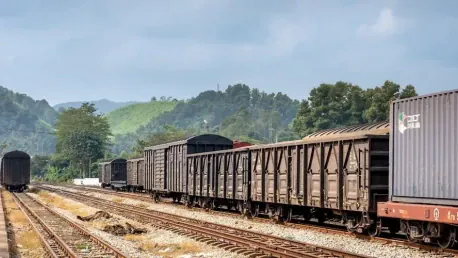The railway freight sector in Spain is witnessing a transformative period as private operators like Captrain and MEDWAY make significant strides, reshaping the market traditionally dominated by the state-owned Renfe Mercancías. This shift towards privatization has had a pronounced impact, resulting in remarkable operational metrics and efficiency gains for private companies. The increasing presence of these private entities has spotlighted their pivotal role in the evolving landscape of Spain’s railway freight industry, suggesting a broader trend towards more effective and sustainable transport solutions. The success of private companies has been largely attributed to their flexibility in logistics and a strong focus on container transport, an area experiencing consistent and robust demand. This trend not only signals a competitive marketplace but also offers an array of benefits to consumers, thus driving the economic growth of the sector.
Captrain España reported a 13.7% increase in freight turnover, with transport volumes rising by 8.5% and train mileage up by 10.8% in the second quarter of 2024. These figures indicate the substantial progress made by private operators in adapting to market needs and offering customer-focused services. Particularly noteworthy is the 40% rise in container transport, a key segment that has been pivotal in Captrain’s growth strategy. On the other hand, MEDWAY has shown its prowess in block train services, exemplified by a 71.4% boost in freight turnover and a staggering 121.6% growth in train mileage. Such impressive results underscore the efficiency and reduced delivery times that block train services can offer, making them an attractive option for freight transport.
Challenges for State-Owned Renfe Mercancías
Conversely, Renfe Mercancías has struggled to keep pace with its private counterparts. The state-owned operator faced a 7.3% drop in freight turnover, a 7.8% fall in transport volumes, and an 8.2% reduction in train mileage during the same period. These declines highlight the intensifying competition and the increasing pressures that Renfe Mercancías faces in a rapidly privatizing market. The poor performance in their container transport segment is particularly concerning, demonstrating the competitive edge that private operators have managed to secure through their more dynamic and flexible service offerings. The trends indicate that Renfe Mercancías will need to implement substantial changes to regain ground and compete effectively in this evolving landscape.
The competitive pressure from private operators has considerably impacted the traditional stronghold of Renfe Mercancías. The state-owned giant’s significant drop in key performance metrics suggests that it has struggled to innovate and keep up with the efficient logistics and customer-centric models implemented by its private competitors. While Renfe Mercancías remains a major player in the market, the data indicates that without adaptations and more strategic initiatives, its hold on the market could continue to weaken. This reality serves as a microcosm of a larger global shift towards privatized, efficient, and flexible logistics solutions in the transport sector.
Future Outlook and Economic Implications
The railway freight sector in Spain is undergoing significant changes with private companies like Captrain and MEDWAY making noteworthy advancements, challenging the dominance of the state-owned Renfe Mercancías. The move towards privatization has considerably improved operational metrics and efficiency for these private firms. Their growing presence underscores their crucial role in the changing landscape of Spain’s railway freight industry, indicating a trend towards more efficient and sustainable transport solutions. The success of these private companies can largely be attributed to their logistical flexibility and strong emphasis on container transport, a sector with consistent and strong demand. This shift not only fosters a competitive marketplace but also benefits consumers, thereby stimulating economic growth in the sector.
Captrain España reported a 13.7% rise in freight turnover, with an 8.5% increase in transport volumes and a 10.8% hike in train mileage during the second quarter of 2024. Particularly significant is the 40% growth in container transport, a critical component of Captrain’s expansion strategy. Meanwhile, MEDWAY has excelled in block train services, achieving a 71.4% increase in freight turnover and an astounding 121.6% growth in train mileage. These impressive outcomes highlight the efficiency and faster delivery times that block train services offer, making them a compelling choice for freight transportation.









